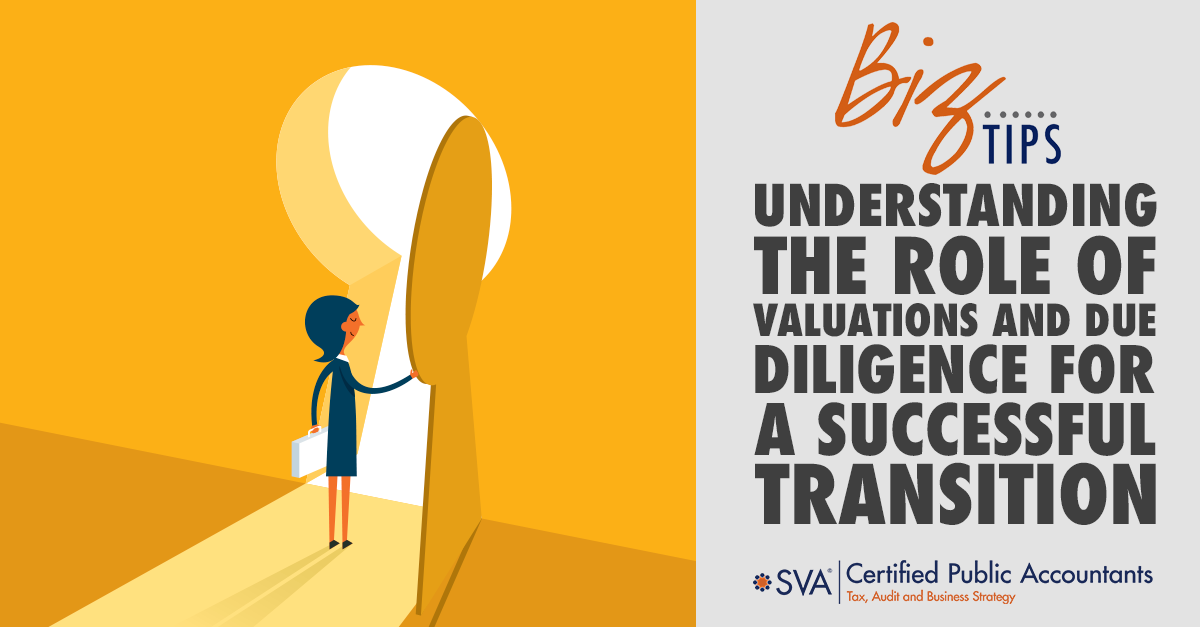| Highlights: |
- The article explains how valuations and due diligence are critical to successful business transitions, providing clarity on value, risks, and deal structure.
- It outlines how thorough financial, operational, and legal due diligence helps identify issues early and supports informed negotiation decisions.
- Guidance emphasizes using valuations and due diligence together to align expectations, reduce surprises, and improve transaction outcomes for buyers and sellers.
|
Business transition planning is the process of preparing your company for a leadership change when you are ready to leave the company. It refers to the approach and preparation of identifying successors within the business and helping them with the process of developing their skills and experience so they can replace the existing leaders at a future date.
Exit planning is not a short-term strategy. It is a long-term view of the future of your business and how you will transition to retirement or another professional endeavor. Exit plans consider the imminent horizon and look out to the future. It doesn’t matter if you plan to transfer ownership to family or employees or sell to a third party. You want to make sure you get an equitable payout for your share. Two important factors that impact a successful transition are valuations and due diligence.
Valuations
A business valuation is the formal process of determining the overall value, as well as the fair market value, of your business. There are many reasons you may need a business valuation including preparing for a future sale, establishing value for owners/partnerships, and taxation.
The significance of a valuation performed on a business lies in the formal processes of knowing what the financials look like, what the historical trends are, and projecting what the financials might look like in the future. A valuation helps to understand a business’s trends, strengths, weaknesses, as well as how it’s fairing against peers and competitors.
What Factors Determine a Business Valuation?
A valuation looks at costs, net assets, management structure, and cash flow generated by the business, among others. It also considers what other businesses in your industry are selling for. Keep in mind that even though the valuation uses historical data, it's the forward-looking data and projections that are most important.
EBITDA (Earnings Before Interest, Taxes, Depreciation, and Amortization) can also determine business value. EBITDA is a historical number that looks back at historical financial statements, but what's important to note is oftentimes business owners just take their financial statements and calculate EBITDA without taking into consideration the items to normalize that number.
Examples of normalizing EBITDA are if you are paying above or below fair market value for rent, if your owner compensation is lower or higher than comparable owners in your industry, etc. It's important to take the historical information and spend some time with the financial statements to dig into what should be the “normal” number. It's not as easy as taking your EBITDA number and applying it to a multiple because that number may be inflated or too low. You must be very cautious on the numbers you're calculating and how you're really deriving the value of your business.
(Download Video Transcript)
When Should a Business Owner Perform a Valuation?
An owner should perform a business valuation in stages. First, you need to gather enough information to have a good understanding of your value. Then you can decide if you want to sell it for that value. If it’s not enough for retirement, then it’s not the right time to sell. Next, if the value isn't at the level you want, you have the opportunity to make changes and increase the value over the duration before you sell the business.
Performing a business valuation at the beginning of the entire process provides you the framework on what you should do in the next 2-5 years until the time you sell. This is the prime opportunity for you to make the necessary changes that will enhance your business value.
What Can Owners Do to Increase the Value of their Business?
There is plenty an owner can do to increase the value of their business. It doesn't necessarily have to only be about sales or expenses. Managing processes and procedures can also have a substantial influence on business value.
To increase business value, owners need to look at the sustainability and accuracy of their financial information. For instance, in the due diligence phase, potential buyers will start to poke holes in the business’s financial information, so owners need to shore up their processes and procedures as well as their financial reporting.
Business owners also need to answer the question, “How important are you as the owner of the business?” If you say you’re pretty important, then that's a problem. Unless you're going to work for another five years or more, you need to have key management in place that can run your business without you. It’s important to note that this takes time. You won’t be able to get your management team up to speed that quickly.
Due Diligence
Due diligence is a comprehensive appraisal of a business, undertaken by a prospective buyer, to specifically establish its assets and liabilities and evaluate its commercial potential. It’s the process of a buyer confirming the accuracy of financial statements, income, revenue, unrecorded liabilities, etc.
There are several components of the due diligence phase besides financial due diligence. There is also a legal due diligence where, for example, a buyer will examine leases, customer contracts, and vendor contracts. Insurance due diligence will look at insurance coverage and any outstanding claims.
Why Do Buyers Perform Due Diligence?
On a case-by-case basis, a buyer will conduct due diligence on whatever aspect of the business they are trying to validate.
For example, in a transaction where assets are being purchased, the buyer will perform the due diligence process to make sure the seller owns all assets free and clear. If a buyer is purchasing the stock of a company, they are more interested in whether there are substantial liabilities in the business.
There are a variety of different items the buyer will look for during the due diligence process but it's really to make sure the assets they want to procure are good.
What Can You Do to Prepare for Due Diligence as the Seller?
This is where you have many opportunities and this is why, if you have enough time to prepare in advance, you're going to get the best value for your business. Pre-planning due diligence on yourself is important because not only do you get to understand your strengths and you get to sell your strengths, but you also get to understand your weaknesses and rectify those weaknesses if you're able to.
During the due diligence process, the buyer will receive financial and non-financial information. They will look at every contract and probably even some contracts you didn't even know you had. They will really look and make sure there are no undisclosed liabilities and that you have all your ducks in a row.
Before due diligence starts, when you're working with a buyer, you can really control what information you give to them and in the format you want to give to them. But once due diligence starts, then what they ask for you have to provide, within some limit. You have a lot less control over what your information looks like and what you're going to provide during the process.
If you know what your information looks like and you've had the opportunity to make any changes or tidy up some things along the way, you will experience a smoother due diligence process and you're looking to get the best value for your business.
Succession
Even if you are a business owner who plans to sell your company to a family member, the due diligence phase and a proper business valuation are still important.
As far as due diligence is concerned, you don't want to hand over liabilities to your family members. Also, it depends on how closely your family member is working in the business. How much do they know, or not know, about the owner-type responsibilities of the business? They will still need to undergo the due diligence process.
In terms of the valuation component, if you're selling to a related party, you need to sell it at fair market value. You cannot sell it at a deep discount because at that point the IRS will get involved. The IRS will look at it as a gifting component to the transaction because you didn't sell it at fair market value. Therefore, you will need a business valuation in order to substantiate that you're selling it at fair market value, or if there's a gifting component, you're going to need a business valuation in order to support that gift.
Getting Started
To begin navigating the business transition process, the number one thing to do is to sit down and write your objectives. What do you want out of the sale of your business? The answers will vary by every single business owner. Some might say they want their key employees to have a job. Others might want their business to be in the same location. And even others want to maximize business value.
The important next step in this process is how to plan for it because how you proceed and who your buyer is are all dependent on those key objectives. So as you go through this process, or if you get an unsolicited offer, these objectives really help you stay true to what you want to happen with your business.
A crucial element in the entire transition process is to have a strategic advisor. Working with a professional who has expertise in the process can be the most valuable component. SVA has decades of experience assisting owners with the transition of their business. Reach out to us today and we can help you with the sale of your most valuable asset.

© 2022 SVA Certified Public Accountants

